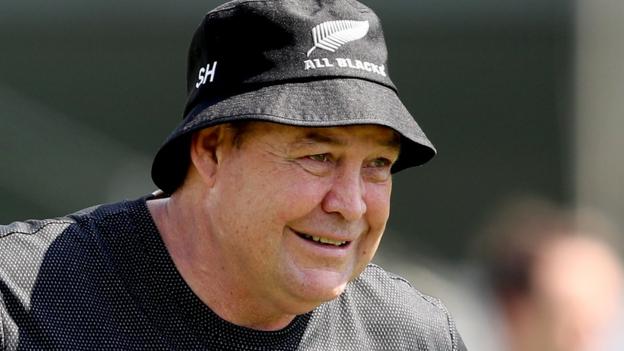
"I'm confident I'm a good coach."
Back in August 2003, not everyone was as sure as Steve Hansen.
The New Zealander was speaking after overseeing a record 10th successive defeat for Wales.
To make matters worse a second-string England side had inflicted it, with Test bit-part players Alex King, Dan Scarbrough and Stuart Abbott among those helping themselves to a 43-9 win at Millennium Stadium.
The weekend after, Wales faced Scotland in their final warm-up Test before the Rugby World Cup.
Hansen named a line-up that included several fringe players.
Second row Gareth Llewellyn, on the bench for the match, remembered the Welsh Rugby Union's reaction to Hansen's selection in an interview with The Rugby Paper back in 2016.
"Our understanding of what happened was that [WRU chief executive] David Moffett went to Steve and said: 'You need to win this game. Your job is not safe so you need to change the team you've picked'," Llewellyn said.
"Steve made his position clear - 'I've picked that side and that's the side I'm going to play. I'm 100% behind the players.'
"He stuck to his guns. Even when he realised the consequences, he didn't panic. We won and Steve hasn't looked back from that day to this."
After a decent run to the quarter-finals of the World Cup, Hansen moved to an assistant coach role with the All Blacks in 2004.
He took over from Graham Henry as head coach in 2011 after New Zealand had ended a 24-year wait for the second Rugby World Cup.
In the eight years and 105 Tests since, he has won 92 matches, another Rugby World Cup and lost just nine times - one less defeat than he suffered during that nine-month losing streak in charge of Wales.
In vastly differing circumstances, his characteristics have been constant - loyalty to his players and belief in himself.
When 33-year-old captain Kieran Read was singled out as a possible weakness in his team after November's defeat by Ireland, with critics suggesting that he was being picked him on reputation rather than recent form, Hansen's response was emphatic.
"Some of those articles are ridiculous and been written by people that have never been in our environment, we've never seen them at a rugby game," he said.
"The good thing people could do is not click on it - then they wouldn't have a job and it'd be great."
It is not as if he has shied away for big decisions elsewhere.
The retirement of Dan Carter, Richie McCaw, Ma'a Nonu and Conrad Smith in the wake of their 2015 Rugby World Cup win required some tricky succession planning.
For one of those vacancies at least, there seemed an obvious replacement.
Beauden Barrett - who reads the game as if in slow-motion but moves through it on fast forward - was the heir apparent to Carter at 10.
Yet, when the All Blacks' creativity was stifled by the British and Irish Lions' rush defence in 2017 and Barrett's goal-kicking faltered under pressure in 2018, Hansen did what few other coaches would have done.
Barrett, winner of World Player of the Year for 2016 and 2017, was shifted out of position.
Initially Damian McKenzie, the diminutive Chiefs back, took up some of the play-making responsibilities from full-back.
When a knee injury ruled McKenzie out of the Rugby World Cup, Hansen doubled down, rather than shelving the experiment, bringing in Richie Mo'unga at 10 and moving Barrett to full-back.
"I've often said if the reward's worth the risk, then take the risk," Hansen said as he named the pair in the same starting XV for the first time in July.
So far the gamble has paid off. Mo'unga and Barrett have been paired for three of the All Blacks four wins in Japan 2019 as the reigning champions have carved through the draw.
England wing Chris Ashton called the decision Hansen's "masterstroke".
"When he first did it everyone was like 'what's he doing, you need Barrett at 10' and now I watch them play and I'm like 'ah, that's why'," he told Rugby Union Weekly.
"Beauden Barrett attacks every kick, he gets counter attack ball every time. When the ball goes out the other side of the pitch, Barrett goes to 10 and Mo'unga goes out the back - it's like a match made in heaven."
On Saturday, Hansen is up against a familiar, and for the most part, friendly foe.
He and Eddie Jones first crossed swords in Super Rugby in the late nineties when Jones was in charge of the Brumbies and Hansen was in the backroom staff at the Crusaders.
The pair exchanged texts in the wake of their respective quarter-final wins to confirm plans for a post-match beer.
"Anyone who loves the game will get my support," said Hansen on Sunday. "He's done a fantastic job with England. They've got a world record for most wins in Test rugby along with ourselves. They've got a harder edge about them.
"You see some of the banter which is really only to help promote the game as being, 'Oh, these guys don't like each other', which couldn't be further from the truth."
Two days later Jones duly delivered, raising the spectre of spying and ratcheting up the pressure on the champions.
Jones did similar before his Australia side upset the All Blacks in the same stage of the 2003 tournament, questioning New Zealand fly-half Carlos Spencer's courage under fire.
It will have to be some stunt though to throw Hansen off his stride as he stalks a third World Cup to end his spell in one of the hottest seats in sport.















 Phone: (800) 737. 6040
Phone: (800) 737. 6040 Fax: (800) 825 5558
Fax: (800) 825 5558 Website:
Website:  Email:
Email: 






